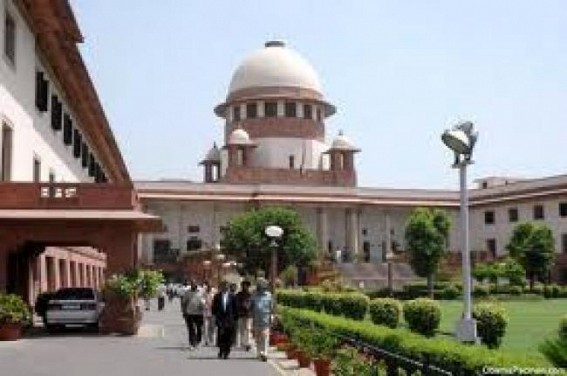Parmod Kumar

PHOTO : Supreme Court of India
The Supreme Court remained defiant in 2014 even as it battled an overt attempt by the Modi government to control the judiciary by bringing in two bills which would change the way judges are appointed and disciplined, asking the prime minister not to appoint tainted parliamentarians as ministers.
The top court went to the extent of reminding Modi of the trust reposed in him to uphold the ideals enshrined in the constitution, emphatically signalling its moral clout in dictating to a popular government.
The court also continued to aggressively question every suspect action of the executive and corporates and bat for the weak and underprivileged sections, stamping its authority in almost every field of governance - be it environment, social and economic justice or corporate functioning.
"The Supreme Court today has become a powerful and influential wing of the state. Fearless and independent, with willingness to enter areas where courts earlier would not venture, it has expanded its jurisdiction to deal with all matters that concern the people. Therefore, it has taken over the mantle of the protector of public interest," senior advocate C.A. Sundaram told.
Thus, it was undeterred by a majority government rushing through constitution amendments to replace the decades-old collegium system for appointing judges with a Judicial Appointments Commission, giving the executive a say in both appointing and disciplining judges.
The move caused much unease in the court, with then chief justice R.M. Lodha unequivocally stating that judges should be appointed by judicially-trained minds."
"Independence of the judiciary is not negotiable. I can say with confidence that judicial independence has come to stay and no effort will succeed in taking it away," Lodha stated.
That did not stop him from canceling all coal blocks allocated since 1993. The court also ruled that bureaucrats cannot enjoy protection of "prior sanction from the government for a CBI probe", recognized transgenders as the "third gender" entitled to benefits available to other backward classes (OBCs) and told corporates such as DLF that they could not exploit their dominant positions.
The message for the corporates was a rather tough one: clean up your houses, enforce the Companies Act and do not swindle investors. Signalling its zero-tolerannce for defiance of orders, it sent Sahara chief Subrata Roy and two directors to Delhi's Tihar Jail in a decision unprecedented in corporate annals.
The court dealt with social problems with a firm hand, taking cognizance of instances of chopping off the hands of two migrant labourers who had migrated from Odisha to Andhra Pradesh and the rape of a woman on the diktat of a village council in West Bengal. It also tackled with sensitivity issues such as rehabilitation of Muzaffarnagar riot victims and those displaced by the Kashmir floods.
Senior advocate Colin Gonsalves praised the court as "the only institution in the country where poor can bring their grievances", but faulted its record in dealing with atrocities against the minorities, tribals and other marginalized.
To make its social face a permanent fixture, the court also set up a social justice bench which became operational from Dec 12. Lawyers reacted cautiously to the idea, saying one would have to wait and watch to see if it was an idea that would work.
The year also saw the court direct the government to shrug off inertia in deciding mercy petitions. "Inordinate, unexplained and unreasonable" delay in deciding mercy petitions was a ground for commuting death into a life term, it warned.
On minorities, the court ruled that Muslim couples can adopt a child under the juvenile justice law and personal laws can't stand in the way of this. Shariat courts and their fatwas have no legal sanctity, it ruled controversially.
The court banned the centuries old bull-fight Jallikattu in Tamil Nadu, elevating the rights of animals to the status of their fundamental rights, warming the cockles of many an animal lover. All this also drew a fair share of criticism of judicial over-reach.
Important judgments/observations:
* Frames guidelines for dealing with death row convicts and their mercy petitions
* Juveniles in conflict with the law will continue be tried by Juvenile Justice Board
* CAG can audit telecom operators
* EC can inquire into allegations of paid news
* Shariat courts have no legal sanctity, says SC
* Don't make people in conflict with law ministers
* Asks for step-by-step plan to clean the Ganga
* Release undertrials who have spent half their term they would have undergone if convicted
* Cancels 214 coal blocks
* Disclose names of foreign bank account holders
* Directs CBI chief to recuse himself from 2G case
* Sets up social justice bench to hear social issues
- Why Modi’s BJP swept key India regional elections
- TIWN’s landmark legal victory against BJP Govt’s Illegal attacks to shutdown fearless Media
- India to be world's third-largest economy by 2030 -S&P Global Ratings
- Tripura's Dark Era : Mafia style Brutal attacks on Journalists, fight for your Citizen rights !
- How to access tripurainfoway.com via HOLA from India



